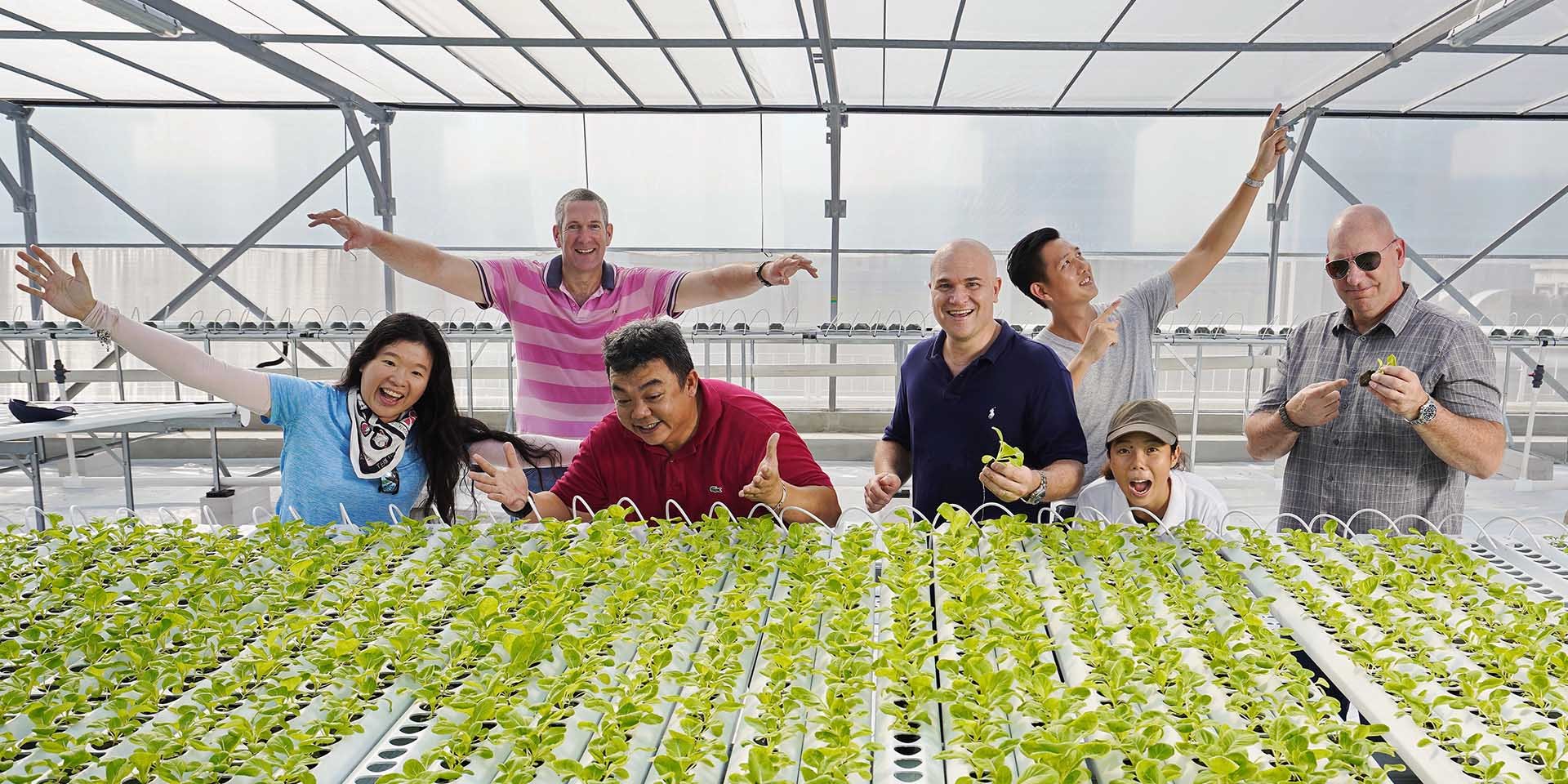Aug 2, 2023
3 Singapore-Based Companies Utilizing Controlled Environment Agriculture to Increase Local Food Supply

Grace Lim and colleague at their proof-of-concept farm, GroGrace. courtesy of Urban Farming Partners.
Written by: Niko Simos
August 2, 2023
Singapore, a captivating island country and city-state nestled in maritime Southeast Asia, has long been renowned for its breathtaking skyline, bustling city life, and vibrant cultural tapestry. With a population of 5.454 million as of 2021, this thriving metropolis faces a unique challenge when it comes to sustaining its food supply. The Singapore Food Agency reveals that over 90% of the nation's food is imported, making it highly dependent on external sources, and only approximately 1% of Singapore's land is dedicated to agriculture. However, in the face of these limitations, Singapore has and will embrace more urban and vertical farming. By maximizing its limited land resources and leveraging cutting-edge technology, Singapore is harnessing the potential of controlled environment agriculture to cultivate a sustainable and self-sufficient future. In this blog post, we will explore three promising companies in Singapore tackling this challenge.
Grobrix

Grobrix’s modular, edible green wall. courtesy of Grobrix.
Grobrix revolutionizes urban farming with its innovative soil-less indoor system, combining the visual appeal of a green wall with the practicality of controlled environment agriculture. Founder Mathew Howe succinctly describes it as "bringing the farming to you."
The shelf-like structure provides the necessary light and water for a flourishing mini garden of leafy greens, herbs, and fruiting plants. Howe emphasizes the advantages of consuming fresh, locally-grown produce, as many vital nutrients diminish shortly after harvest. Grobrix also prioritizes circularity in its approach. Their soil-less indoor farming system utilizes efficient water usage and incorporates advanced technologies to create a closed-loop ecosystem. For example, nutrient-rich water is circulated within the system, minimizing waste and conserving resources.
Initially introduced in residential pilot projects, Grobrix has now expanded its reach to commercial ventures, including restaurants, offices, supermarkets, and even public spaces.
GroGrace

Grace Lim of Urban Farming Partners and GroGrace. courtesy of Urban Farming Partners.
GroGrace, a concept farm of Urban Farming Partners, began its journey in 2019, with a vision to provide a healthy, pesticide-free diet for founder Grace Lim's three children. Recognizing the need for quality vegetables, Grace built her first urban farm at home. This ignited her passion for sustainable food production, leading her on a quest to find farming solutions that would alleviate environmental pressure, enhance biodiversity, ensure food security, and improve the nutritional value of vegetables. A fortuitous encounter with the agriculture advisor of the Netherlands Embassy four years ago paved the way for the birth of GroGrace.
Situated within the confines of a 483sqm warehouse in an industrial building, GroGrace operates within a total cultivation area of 720sqm (four layers of 180sqm each). Leveraging Dutch horticulture technologies and employing the Dry Hydroponics method, they cultivate a variety of lettuce and herbs. This approach maximizes growing conditions, carefully selects seeds, and embraces clean and green cultivation practices, resulting in high-quality, nutrient-rich crops. One notable aspect is their use of a living ecosystem in the water that nourishes the plants, incorporating healthy organisms and bacteria.
The future of agriculture in Singapore and the wider region lies in indoor farming, according to Grace. With climate change, water scarcity, and urbanization posing significant threats to traditional farming methods, Grace believes that indoor farming provides a viable and sustainable solution to ensure year-round production regardless of external weather conditions, offering a consistent and reliable food supply.
ComCrop

ComCrop team members. courtesy of ComCrop.
ComCrop, Singapore's pioneering rooftop greenhouse farm, is making significant strides in the local agricultural landscape. With their commitment to producing cost-effective vegetables and reducing the country's reliance on imports, ComCrop has emerged as a game-changer. Led by CEO and co-owner Peter Barber, the company combines innovation, sustainability, and a strong emphasis on delivering high-quality produce to consumers.
ComCrop stands out as the first commercial rooftop farm in Singapore, utilizing five controlled environment agriculture (CEA) greenhouses spread across a vast 2,800 square meters. The farm's efficient operations involve the continuous movement of 8,000 plants through various stages of growth within a mere 25-day cycle. To enhance shelf life and preserve nutritional value, ComCrop harvests its vegetables with the roots intact. Every month, a staggering 135,000 plants (equivalent to 65,000 packets of vegetables) are cultivated within the expansive greenhouses located on a vast factory building in Woodlands. These thriving crops are meticulously grown to cater to the demands of FairPrice supermarkets and the popular online grocer, RedMart. Peter confidently states that with further improvements, the farm has the potential to yield over 200 tonnes annually.
ComCrop's remarkable achievements have earned recognition and support from the Singaporean government. The company was honored to host Grace Fu, Minister for Sustainability and the Environment, during the launch of its 2,800-square-meter hybrid greenhouse complex. ComCrop's participation in the Singapore Green Plan 2030 further highlights its significance in Singapore's food production landscape.
In conclusion, Singapore's commitment to sustainable food production and urban farming is driving a transformative shift in the city-state's food landscape. Singapore Food Agency aims to increase local production to achieve a goal of “30 by 30”, which is to build up the agri-food industry's capability and capacity to produce 30% of their nutritional needs locally and sustainably by 2030, up from less than 10% today. Technology advancements will be key in unlocking the potential of the agri-food industry to “grow more with less”, in a sustainable manner.
Through the efforts of companies like Grobrix, GroGrace, and ComCrop, fresh and locally grown produce is becoming more accessible to Singaporeans, promoting healthier lifestyles and reducing the country's reliance on imported food. These companies are leading the way in maximizing urban spaces, implementing innovative technologies, and prioritizing circularity to create a more self-sufficient and environmentally conscious food system.
